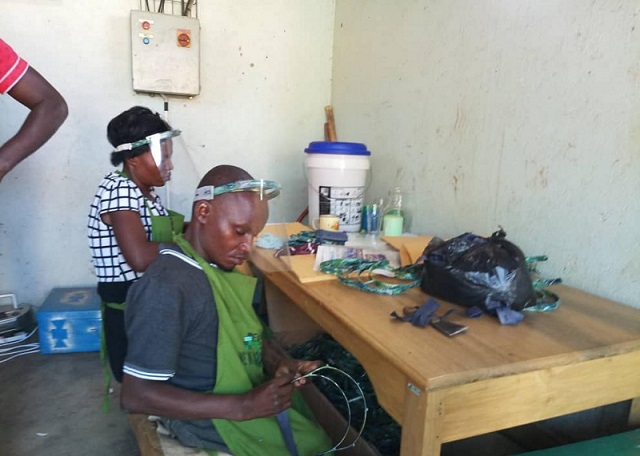
Masaka, Uganda | THE INDEPENDENT | The emergence of the global coronavirus pandemic could turn into fortunes to Persons with Disabilities in Masaka district who have started making face-shields, a type of protective gear used to stop the transmission of the disease.
The group had initially set out as environmental protection ambassadors whose task was to collect all non-composting plastic waste materials littered in the community before they can eventually sell it to recycling companies that can find a use for it.
However, out of their partnership with a charity organization Eco-Brixs, the group has undertaken a project to reproduce plastic waste materials into locally made face-shields as a timely response to the coronavirus.
At their main collection centre at Kassijjagirwa cell, located at the outskirts of Masaka Municipality, the group collects heaps of plastic wastes from around the community. By the use of simple machinery, the materials are smelted and moulded into face shields used to prevent respiratory discharge from one person to another.
The plastic shields according to medics protect eyes, nose and the mouth from potentially deadly droplets through which the infection is transmitted. They are a crucial outfit at a time when the government is recommending wearing face coverings in public settings where other social distancing measures are difficult to maintain.
Johnson Musinguzi, the project operations coordinator says they derived the idea out of a pursuit to have a contribution towards the fight against COVID-19. He explains that because they had accumulated huge quantities of plastics, they found it necessary to add value and put it back to use.
The shield is made in the form of a semicircle, fitted with a transparent glass like frame that is suspended on another plastic ribbon which rests on the forehead of a person putting it on. Musinguzi says that they are replicating the designs from samples they have seen from elsewhere.
The locally-made face-shield, according to Musinguzi is a more durable protective gear compared to the soft-cloth facemasks that can only be used for a short while. He indicates that they are currently operating with a daily average production capacity of 100 shields largely made by Persons with Disabilities.
Bernard Mukalazi and Maria Regina Nabisubi, some of the people directly involved in the making of the shields say the project is equipping them with survival soft skills they had not envisaged given their poor educational background.
Mukalazi appreciates that the project is so friendly to Persons with Disability many of whom had been marginalized in their communities due to lack of formal employment and inability to do hard labour.
Andrew Bownds the Chief Executive Officer at Eco Brix, says he currently looking forward at increasing the production capacity of the group, indicating that they have reached out to their friends in Austria asking them to support as a contribution to towards improving the livelihoods of vulnerable groups of people in Masaka sub-region.
******
URN
 The Independent Uganda: You get the Truth we Pay the Price
The Independent Uganda: You get the Truth we Pay the Price





